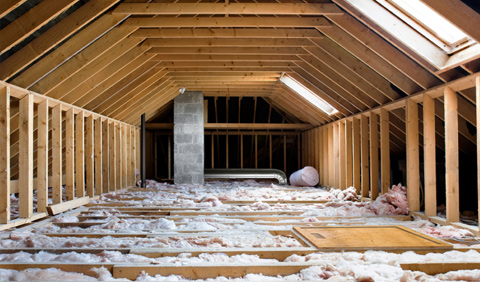Some of the biggest air leaks in your home can often be traced to the attic, resulting in sky-high energy bills and a house that’s too warm in summer, and too cold in winter. However, the good news is that the attic is one of the easier rooms to insulate and air seal, leading to improved home comfort, lower energy bills and a better overall energy performance.
Chimney
- Seal holes or gaps around chimneys or furnace flues to prevent air leaks.
- Use metal flashing for larger gaps and high temperature caulk for smaller ones.
- Identify and seal all air leaks before adding additional insulation.
Plumbing Stack - Seal small gaps around plumbing stacks and electrical wiring.
- Use caulk for small gaps and spray foam for gaps up to 3 inches in diameter.
- Use a combination of foam board and foam spray for gaps larger than 3 inches in diameter.
Attic Hatch or Door
- Use weatherizing materials or a pre-made attic cover to insulate your attic hatch or door.
- Save energy and keep your home comfortable.
- Learn more:
- A home’s exterior is known as the “envelope” or “shell” which, when properly insulated, can save up to 10% on annual energy bills.
- Or hire a contractor who’ll use specialized diagnostic tools to identify and seal hidden air leaks before adding insulation.
- TIP: if your insulation is level with or below the attic floor joists, you’ll need to add more.
- Recommended insulation level for most attics is 12-15 inches, depending on insulation type (R-38).
Ducts
- Seal any holes or tears using mastic or metal (foil) tape.
- Don’t use “duct tape” because it doesn’t last.
- Seal all accessible ducts in the house, including the basement, garage or crawlspace.
- Learn More:
- Ducts distribute conditioned air through houses using forced air heating and cooling systems.
- Up to 20% of air is lost due to leakage, holes and poorly connected ducts.
- Result: an inefficient HVAC system, high utility bills and uncomfortable room temperatures.
Attic Ventilation
- Proper attic ventilation using natural airflow prevents build-up of ice dams and extends the life of roof shingles.
- Eliminates need for attic vent fan, thereby reducing energy costs.
- Make sure attic soffit and gable vents aren’t blocked to ensure free airflow.
- If you don’t have gable vents, you may have ridge vents or vents through the roof deck.

